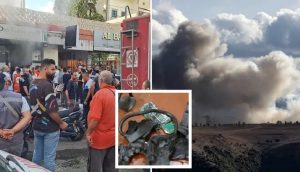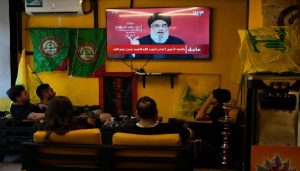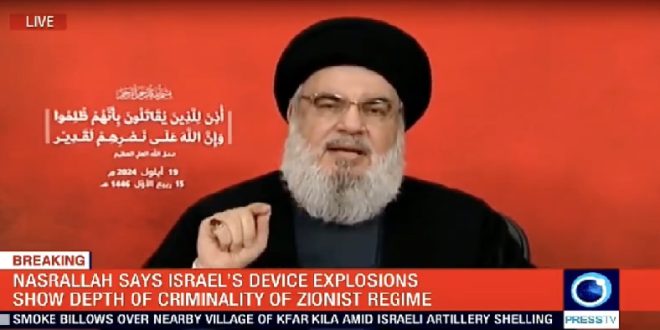20-09-2024
BERIUT: Hezbollah’s leader has said bomb attacks using thousands of the Lebanese armed group’s pagers and radios “crossed all red lines”, and accused Israel of what he said represented a declaration of war.
In a much-anticipated speech, Hassan Nasrallah acknowledged Hezbollah had suffered an “unprecedented blow”, but he vowed it would continue fighting and inflict a “just punishment”.
 Israel has not said it was behind the blasts on Tuesday and Wednesday, which Lebanese authorities said killed 37 people and wounded 3,000.
Israel has not said it was behind the blasts on Tuesday and Wednesday, which Lebanese authorities said killed 37 people and wounded 3,000.
As Nasrallah spoke, Israeli warplanes caused sonic booms over Beirut, scaring an already-exhausted population, and others struck targets in southern Lebanon.
The Israeli military said it was operating to “degrade Hezbollah’s terrorist capabilities and infrastructure” and to “bring security to northern Israel”.
Eleven months of cross-border fighting between Hezbollah and Israel sparked by the war in Gaza have killed hundreds of people, most of them Hezbollah fighters, and displaced tens of thousands on both sides of the border.
Hezbollah has said it is acting in support of the Palestinian armed group Hamas. Both are backed by Iran and proscribed as terrorist organizations by Israel, the UK and other countries.
There were no surprises in Hassan Nasrallah’s televised address on Thursday afternoon his first public reaction to the exploding device attacks which created panic across Lebanon and raised fears of another major war between Hezbollah and Israel.
In what was a humiliating security breach, 12 people were killed, including two children, when pagers used by Hezbollah members to communicate blew up almost simultaneously across the country on Tuesday, according to Lebanon’s health minister. Another 25 were killed when walkie-talkies exploded the next day.
Reports citing Lebanese and US sources said Israeli intelligence operatives were likely to have planted small amounts of explosives inside the devices or their batteries.
 “The enemy crossed all rules, laws and red lines. It didn’t care about anything at all, not morally, not humanely, not legally,” Nasrallah said.
“The enemy crossed all rules, laws and red lines. It didn’t care about anything at all, not morally, not humanely, not legally,” Nasrallah said.
“This is massacre, a major aggression against Lebanon, its people, its resistance, its sovereignty, and its security. It can be called war crimes or a declaration of war – whatever you choose to name it, it is deserving and fits the description. This was the enemy’s intention,” he added.
The Hezbollah leader acknowledged that this was a massive and unprecedented blow for his group, but he insisted that its ability to command and communicate remained intact.
Nasrallah’s tone was defiant and he vowed a harsh punishment but, again, he indicated that Hezbollah was not interested in an escalation of its current conflict with Israel.
The group’s cross-border attacks, he said, were going to continue unless there was a ceasefire in Gaza, and that no killings or assassinations would return residents to northern Israel.
Shortly before the speech, crowds of Hezbollah supporters gathered in the capital’s southern suburbs to bury two members killed on Tuesday. Some people said they had been shaken by the explosions, but that they were determined to resist.
On Thursday morning, Hezbollah fighters in southern Lebanon fired two anti-tank missiles across the border, followed by drones.
The Israel Defense Forces (IDF) said two Israeli soldiers were killed and a third seriously wounded. (Int’l News Desk)
 Pressmediaofindia
Pressmediaofindia




